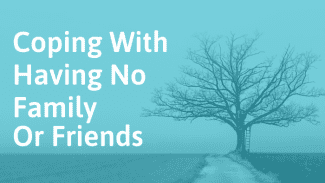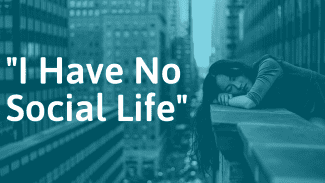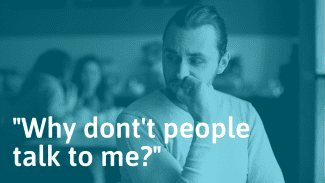Having no friends as an adult is an uncomfortable topic to discuss, but looking into the reasons behind it can be very helpful and make a big difference in your social life.
This article focuses specifically on what to do if you don’t have any friends after college or in your 20s. In our main guide on not having friends, you’ll find a comprehensive walk-through of why you might be lonely and what to do about it.
Below are some common reasons for your current situation, followed by tips on what you can do.
Not taking initiative to socialize
In college, we meet like-minded people on a daily basis. After college, socializing suddenly takes a very different shape. Unless you want to limit your social life to your job or partner, you have to actively seek out like-minded people. The simplest way to do this is to figure out in what way you can make your existing interests more social.
What you can do
- Join groups related to your interests. If you don’t have any strong passions, anything that you enjoy doing can serve as social interest. If you like writing, you can join a writer’s club. If you like photography, you can join a photography workshop. Meetup.com is a good place to look.
- Take the initiative. If you meet someone you have things in common with, ask for that person’s number or Instagram. It doesn’t have to be more complicated than saying “It was fun talking to you. I can let you know the next time I’m going to that crafts class I was talking about”. or even “It would be nice to grab a coffee and talk more about astronomy”. Invite them the next time you are going somewhere they might want to join.
- If you bonded over music or a movie genre you both like, send them a message later on mentioning an upcoming film you thought of going to and whether they’d like to join.
- Take people’s propositions seriously. It’s usually during those small friendly talks that someone eventually throws an invitation to “someday hang out”. We tend to think people are just offering as a way of being polite but don’t let that hold you back from messaging “Hey, I thought to take you up on that offer.” It’s likely that the person you enjoyed talking to that day really does want to meet, but like you, they’re too shy to take that first step and initiate.
Here are more tips on how to make friends after college.
Having changed in personality and interests
In college, you’re exposed to a lot of new and interesting ideas. It’s only natural that you finish those years a bit different than when you first started them.
In your 20s, common interests you shared with certain people begin to fade, and as much as it’s uncomfortable to think about, it’s necessary in order to keep growing.
Accepting the gradual distance that has formed can make way for new relationships to enter your life. If you find that you have a hard time connecting with friends because you’ve changed as a person, use this as your starting point.
Ask yourself, what has changed about me? What conversations would I like to have now? On what topics? The more you understand who you’ve become, the more you’ll know where to look in terms of people you want to connect with.
What you can do
- If there’s a cause you’re interested in helping, look for places to volunteer. The new people you’ll meet in those settings probably share that same interest too (or else they wouldn’t be there).
- The same goes for clubs and hobbies. Maybe your childhood friends don’t appreciate gaming or books as much as you do, but with a bit of searching, you’re bound to find groups of people who do. Websites like https://bumble.com/bff or https://www.meetup.com are great places to start.
- Use podcasts as a way of discovering communities. See who else listens to the podcast and try sparking conversations in their forums.
Having moved to a new place
Moving to a new state or country can be challenging. People move because of work, school, or simply because they’re looking to open a new chapter in their life. Either way, it’s not easy, especially if your friends and family are nowhere near. You need to get used to a new culture, a new way of doing things and maybe even a new language. This transition can be intimidating for both the shy and the more outspoken person.
What you can do
- Your co-workers are probably the first people you can attempt to make a connection with. Don’t be afraid to come off as needy or the “new person”. Embrace that title with dignity. Being new makes you all the more interesting. Usually, when you’re new, you’re assigned to someone who goes through the basics and guides you on your first days. Don’t be afraid to ask him casual questions like “What are some nice places to hang out?”. Try mentioning your hobby, “Do you know of any basketball court around?” You might find out that you and your co-worker share the same interest. Also, don’t be discouraged if your co-workers are older than you. Workplaces are different from our usual school setting so don’t put that much emphasis on age. You can be 25 and still enthusiastically hit it off with someone twice your age by discussing a shared interest.
- If you’re not working or you’re working as a freelancer, try checking Facebook Groups for expats and other online communities for foreigners. There are plenty of other people out there in a similar situation as yours.
- If you moved to a foreign country, YouTube is a great platform to check out. Many people upload videos showing their daily routines as foreigners. Try seeing if there’s anyone living in the country you’re currently at. Many of them vlog their solo walks around the city, so regardless of whether you actually end up meeting them, let their videos inspire you to do some solo exploration yourself.
- If you’re into video games, https://www.twitch.tv is a good place to connect with people. Instead of spending your evenings playing alone, try streaming it and look for people streaming who live in your area.
- Go out for walks. Explore the city and get used to your new surroundings. The more familiar things are the less scary they become. Don’t wait to make friends in order to walk around. Go to the park, take a book with you or simply listen to music or a podcast. If you’re worried about looking lonely, put on your running shoes and make it look like you’re out for a light jog.
- Become a regular at a café or bar. Other regular customers and workers at the place will start to feel a lot more familiar and within time you might even build up the confidence to talk to one of them. If you find yourself standing in line with a regular customer you see on a daily basis, ask for their thoughts on a specific cake or sandwich. You can throw in that you’re new to the area and you’re testing out the best coffee places in town.
- Talk to the staff at the local shops to get information on social gatherings. For example, if you’re into reading and you find yourself wandering around bookshops, talk to the person working and ask if they host any book readings at the place or if they know of any good book clubs. If you’re interested in a certain type of music, for example, jazz, go to a music store that sells saxophones and other instruments and while you’re checking them out, casually ask the workers if they know of any jazz bar in the area. Remember that the locals have a lot of valuable information on what interesting things are going on.
Main article: How to make friends in a new city.
Being shy or having social anxiety
If you’re the kind of person who rarely raises their hand in class, seldom speaks up in group discussions and gets overwhelmed when strangers approach them, making new friends can be more frightening. As a shy person, you may find yourself keeping quiet in situations where you wish you had the confidence to speak up and it can be discouraging to hold yourself back. That being said, it’s a personality trait you can work on.
What you can do
- We tend to feel confident when we feel there’s something worth feeling confident about. Work on building daily habits you feel proud of. Start by writing down the little things you want to implement into your day and stick to them. It could be as small as waking up at the hour you set for yourself or finally going out for that run. Go back to practicing an instrument you put off or go ahead and finally bake that cake you thought was too complicated. When you challenge yourself in the comfort of your home, you start to take that brave sensation with you to other places as well.
- Treat small exchanges with strangers as an opportunity to practice eye contact. It could be the person behind the counter at your regular café asking for your name, or the person at the train station handing you your ticket. It could even be letting someone elderly take your seat on the bus. That simple nod and smile you throw to the other, within time, will feel more natural.
- Try taking up a new language. Taking public language classes is a great environment to socialize. Especially because you’re all in this awkward beginner stage and everyone is feeling a bit self-conscious. It’s the perfect place to learn how to take it easy and laugh at yourself. Try inviting someone to grab a bite afterward: You can mention that you’re going to eat and ask if anyone wants to keep practicing the language after hours over a sandwich.
- Make peace with your shyness. In a society where so many people speak their mind without thinking twice, a certain amount of quietness is in fact deeply appreciated. We tend to be very hard on ourselves and think that shy people are seen as boring or without personality. But in a lot of situations, shy people are actually perceived as humble, calm, and collected.
Shy people aren’t always shy. Acknowledge your other sides as well and remember the situations in which you felt comfortable expressing yourself. We usually feel at home around our family so if you have any siblings you spend time with, use that to remind yourself of how outgoing you can actually be.
Not being present or attentive
Naturally, we spend a lot of time thinking about ourselves and the things we need to do. This isn’t necessarily a bad thing, and personal goals are worth spending time on. But if we want to establish meaningful connections with others, we have to make room for their personal lives as well.
Try looking back at your previous relationships, how involved were you? Were you present in conversations, or were you mostly absorbed in your plans for the day?
Remember that being a good listener is crucial in relationships; people don’t simply assume you’re there for them, they need to genuinely feel it.
We all know how nice it is to receive a message “How did it go today?” after a job interview, or “How did the test go?” after you spent the whole week cramming for it. It’s only natural for people to distance themselves from us if they sense we’re hanging out with them out of pure habit or simply to “kill time”.
What you can do
- To create that sense of genuine interest, ask questions relevant to previous conversations you’ve had. It shows the other person you’re truly present and listening.
- Take note of meaningful events like birthdays, an upcoming date, a job interview, a test. If needed, write it down.
- Avoid using your phone while talking, texts and notifications can wait. It’s more important you stay present with the person in front of you.
- Be mindful of body language. For example, if your friend fidgets around or lowers their gaze while talking, this could be a sign they’re a bit stressed, even if they don’t necessarily mention it out loud. Noticing those subtle cues creates a deeper connection to the person in front of us and grounds us in the present moment.
- Keeps your promises. If you said you’d call in the evening, make sure you actually make the call. It’s understandable that life can get busy and you forget certain things, but make sure those moments are the exception, and that normally you keep your word.
Not taking all the chances you get to socialize
We can get pretty creative when it comes to turning down offers. Especially for things that are out of our comfort zone. Too tired, too complicated, and not interested enough are just a few of the things we say. While it’s true you may be tired, constantly giving into that will eventually cause others around you to stop offering.
One of the reasons we quickly say no is because we believe we have the night (or day) “figured out”. We cancel it because we suppose that nothing too interesting will happen. The thing is, we never really know what saying “yes” will lead to. Keep in mind that relationships are built on mutual experiences and the time you spend together is what eventually strengthens your bond.
What you can do
- Work on saying yes, even if the offer doesn’t necessarily fit your current mood. For example, if a friend offers to grab a bite but you just ate, don’t automatically turn it down. Join them and order something to drink instead. The important part is that you meet up and connect, not that you eat. Likewise, if they’re in the mood for a beer but you’d rather not drink alcohol, go out and order something soft instead.
- If you find it hard to do things they seem to enjoy, don’t let that be an excuse for not meeting up. Instead, offer to do things both of you like. For example, if they enjoy clubbing and you don’t, you can turn down the offer, but add to that an offer in return. “I don’t like clubs that much, too loud for me, but hey! I’d love to hang out. How about we grab coffee tomorrow morning?”
- Remember that comfortable evenings on your own are a lot more available than a night out with your friends. Don’t take their offers for granted.
Having mental health challenges
Another reason why you may have found yourself without friends can have to do with something you’ve been going through. The way in which you view the world and how you interact with others is usually a reflection of your own mental state. When you’re going through a difficult time, other people may seem less approachable and the world intimidating.
As a result, you can find yourself pulling away from the people around you, to the point you longer have someone to talk to. If you’re feeling unlike yourself, either depressed, anxious, or simply out of place, it’s necessary you look into it.
What you can do
- Put your mental health first and don’t hesitate to seek professional help. It could be either online or face to face. A good connection with your therapist is crucial and even if it takes a while to find one that suits you, it’s worth the search.
- Instead of distancing yourself, go ahead and share with the people close to you why you’ve been pulling back from them. A lot of times people can mistake our “disappearance” as a sign of us not wanting to be around them when in fact, we’re simply going through a rough time that has little to do with them.
- If you’ve been alone for quite a while and find it uncomfortable to call up people from the past, try talking to others online first. That way, you’re getting comfortable with interacting and sharing your feelings even if it’s not yet in person. There are plenty of forums where you can write down what you’re going through in a completely anonymous way, and people will respond. Two good websites for finding your community are Reddit and Quora. Two good websites for mental health are Kooth and TalkSpace.
Remember to use the internet in moderation and as a tool to help you share what you’re going through, not as a form of escapism.
- Try journaling. Writing things down is a useful tool and can help sort out your thoughts. By finding the right words to explain what you’re going through you’re creating a clearer headspace and making room for better decisions.
- As much as you may lack the motivation to do so, focus on moving your body. It doesn’t have to be a high-intensity workout at a gym. It could be a few stretches from the comfort of your home, or a simple stroll while listening to your favorite playlist or podcast. Don’t be afraid to call up a friend to join, even if it’s been a while since you’ve last spoken. The fact that we’re not in our best mood doesn’t mean others don’t want to be around us. On the contrary, many people enjoy giving advice and sharing their own experiences. If you don’t have someone to call, there are plenty of teachers on youtube offering live sessions. Hundreds of people from around the world practicing all at once may help alleviate the loneliness and get you focused on your body.
See our guide on how to make friends when you’re depressed.
Not letting people in
Try making your conversations a bit more personal. Deepening our relationships means we’re going to expose ourselves and let others see the little quirks and details of what it means to be us. Don’t be afraid to ruin some sort of image you think people have of you. It’s easy to seem cool and fun when it’s from a distance. What’s a lot harder and braver is opening up and letting others see different parts of your personality.
Studies show that we have to open up about ourselves in order for people to get to know us.[1]
What you can do
- It’s not true that people only want to talk about themselves. In between asking questions and listening attentively, give examples from your personal life. Talk about your interests, what hobby you’re currently into, what movie you’ve last seen. Speak up about the difficulties as well, of an argument you’ve recently had or insecurities. Even if you feel like a burden to the other person, you’re probably not.
—
You should be proud of the fact you’re looking for ways to improve your social life. Many people are afraid to admit they even need a friend in the first place.
Remember that it takes time to make friends. Every initiative you take and every time you talk to a new person is a step toward a fulfilling social life.













